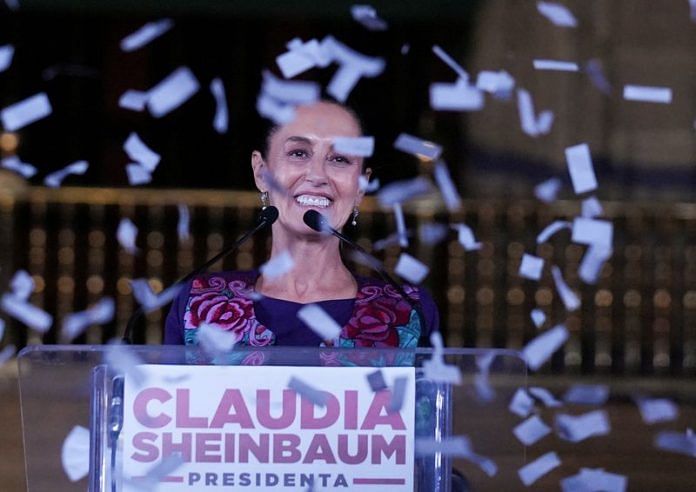By Anthony Esposito
MEXICO CITY (Reuters) – Mexican President-elect Claudia Sheinbaum’s ruling Morena party and coalition partners are close to securing a super-majority in both chambers of Congress, which would pave the way to passing controversial constitutional reforms.
Below is a look at the potential moves that have markets and investors concerned, and led to a sharp decline in Mexican asset prices on Monday.
LAST-DITCH EFFORT
Sheinbaum’s mentor, outgoing President Andres Manuel Lopez Obrador, proposed a series of constitutional reforms in February, some of which critics argue would eliminate much-needed oversight bodies, erode checks and balances and concentrate more power in the executive branch.
Now, with a two-thirds majority locked in the lower house of Congress and within his grasp in the Senate, Lopez Obrador will overlap with the newly elected lawmakers in his final month in office in September. Lopez Obrador on Monday suggested he would make a last-ditch effort to ram them through before handing the baton over to Sheinbaum.
“I’m going to talk it over with Claudia … because we presented the proposals that are in Congress, to see which of those initiatives we can push for and get approved,” Lopez Obrador said at his daily press conference.
Concern about the shakeup sent stocks falling over 6% and the peso as much as 4.3% lower.
INDEPENDENT OVERSIGHT BODIES
Among the proposed changes, Lopez Obrador wants to scrap the constitutionally-enshrined freedom of information body INAI, federal anti-trust agency COFECE, development evaluation agency Coneval and telecoms regulator IFT.
It would also put the energy ministry in charge of energy regulator CRE and national hydrocarbons commission CNH, both of which are now independent and which, like the other autonomous bodies, Lopez Obrador charges with fostering corruption.
OVERHAULING THE ELECTIONS AUTHORITY
Throughout his administration, Lopez Obrador often lambasted and bumped heads with such agencies, including the National Electoral Institute (INE), which he is seeking to completely overhaul.
As many as 700,000 people filled the streets of Mexico City in February to protest of the proposed dismantling of the INE.
The reforms are a way of “instituting electoral reform to cement Morena’s political hegemony; lowering the bar for public referendums to obtain legal validity,” said Nicholas Watson, managing director of consulting firm Teneo.
Lopez Obrador has frequently used such referendums to pursue contentious policies like cancelling a partly-built Mexico City airport before he took office in a vote in which just a fraction of the public participated.
STRUCTURAL CHANGES TO THE JUDICIAL, LEGISLATIVE BRANCHES
Lopez Obrador also wants big changes in the judicial system, which would see popularly elected Supreme Court justices, circuit magistrates, district judges, and electoral authorities.
The number of supreme court justices would be cut to 9, from 11. Additionally, all magistrates and judges would need to be renewed in an extraordinary election to take place in 2025, part of a series of moves critics say would curtail independent courts.
Lopez Obrador has said the changes are needed because the current judiciary serves a minority and sometimes organized crime at the expense of society.
His reforms would also cut the number of members of the lower house of Congress to 300, from 500 and slash the number of senators to 64 from 128.
S&P Global Ratings said while greater centralization of political decision-making and mixed political signals under Lopez Obrador had reduced the independence of several agencies, important checks and balances across branches of government, including the judiciary, remained.
“Measures that weaken checks and balances could affect private-investor confidence by creating perceptions of greater risk, potentially affecting economic growth and sovereign creditworthiness,” it warned.
LAUNDRY LIST
The proposed reforms, among which Lopez Obrador may need to choose given the tight window between the final legislative session under him and Sheinbaum’s October inauguration also include:
— Expanded retirement benefits for senior citizens 65 years or older and disabled people
— Improved student grants
— Paid vocational training for young people between the age of 18 and 29
— a prohibition on genetically modified corn
— a ban on water rights in areas facing drought
— a ban on open pit mining and fracking
Some of the reforms if approved could aggravate a worsening budget deficit which analysts say is likely to be a major burden for Sheinbaum once she takes office.
(Additional reporting by Noe Torres; Editing by Christian Plumb and Alistair Bell)
Disclaimer: This report is auto generated from the Reuters news service. ThePrint holds no responsibilty for its content.



